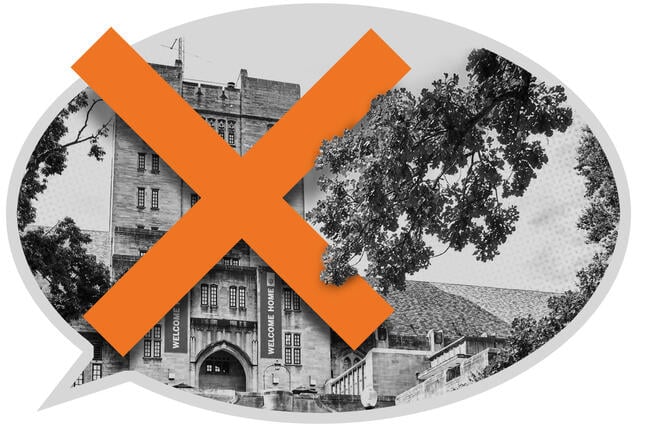You have /5 articles left.
Sign up for a free account or log in.

IU Bloomington faculty say they’ve been asked to sign away rights to criticize the institution or its current and former officers and employees if they want a voluntary retirement program payout.
Indiana University at Bloomington has—like many other employers seeking to shed employees—recently offered incentives for faculty to retire. It began a voluntary retirement program in the fall, a university spokesperson said.
But professors who wanted to take advantage of the program were asked to sign away their right to criticize the university and any of its current or former leaders and employees, according to copies of the agreements that faculty shared with Inside Higher Ed.
One unsigned agreement said the faculty member must “not defame, or otherwise disparage, the University” or any of its “current or former trustees, officers, employees, agents, representatives, attorneys, or insurers.” It also said the employee must agree “not to make negative statements of any kind regarding the University.”
“Wow, that’s really broad,” said Mark Criley, a senior program officer in the American Association of University Professors’ Department of Academic Freedom, Tenure and Governance. He said he can only think the NDAs are “an attempt to insulate the administration and the institution from criticism.”
Graham Piro, Faculty Legal Defense Fund fellow at the Foundation for Individual Rights and Expression, called it “incredibly broad language” that could make retired faculty “think twice” about speaking about major events at their former employer.
IU Bloomington, Piro noted, “has had a number of free speech controversies over the past couple of years,” including the cancellation of a Palestinian American artist’s exhibition and its handling of pro-Palestine protests. Last spring, IU Bloomington faculty voted no confidence in President Pamela Whitten after multiple academic freedom controversies.
About 35 IU faculty have already agreed to not disparage or defame the university in exchange for the payouts, according to Indiana Public Media, which reported last week on the nondisparagement agreements.
A recent IU Bloomington retiree who told Inside Higher Ed they signed a Voluntary Faculty Retirement Incentive Program agreement in April said they wished to remain anonymous for fear that “simply reporting factually on the agreement may be misconstrued as violating its nondisparagement terms.” Even so, the faculty member said, “I was quite grateful for the retirement incentive and have great feelings toward IU.”
A Limit on Shared Governance
Asking faculty to sign nondisparagement or nondisclosure agreements isn’t entirely new in higher education—or even among Indiana universities. In 2018, the AAUP revealed that Purdue University Global was preventing former employees from speaking ill of Purdue by using NDAs. Purdue University Global quickly abandoned these restrictions following media reports.
But faculty in the U.S. have a tradition of remaining engaged in their universities after retirement, and that might call for them to be critical, including in shared governance of their universities. Those honored with the title of professor emeritus often can continue serving in faculty governance bodies, though in many cases they don’t have the right to vote.
Piro said there’s value in former faculty “who may have unique insights to offer about an institution” being able to speak out. Criley said professors emeriti “serve as sort of elder statespeople who have vast institutional knowledge and can provide useful feedback, both positive and negative, on decisions that are made at the institution—and perhaps even do so more candidly when they don’t have an appointment any longer.”
Kenneth Dau-Schmidt, Carr Professor of Labor and Employment Law at IU Bloomington, said faculty often ask him for informal advice because he teaches employment law. He said a couple of IU Bloomington faculty notified him within the last month or so about the nondisparagement provisions. Dau-Schmidt said it’s the first time he’s seen such NDAs at the campus for scholars who weren’t subject to discipline.
“It’s part of a less warm relationship between us and the administration,” he said. “It’s one more step in being treated as a replaceable employee rather than an important part of the governance of the university.”
IU spokesperson Mark Bode told Inside Higher Ed in an email that “the language in the contracts is standard for separation agreements with payouts at Indiana University.” The university didn’t provide interviews this week and didn’t confirm or deny the authenticity of the provisions in the agreements shared with Inside Higher Ed.
Dau-Schmidt said “courts take a very dim view” of public servants requiring other public servants to agree not to report violations of “the public trust,” noting that Indiana and federal whistleblower laws still protect public employees’ rights to report law violations—even if they signed the NDAs. But, though NDAs’ “legal effect might be fairly narrow,” he said their practical effect can be broader because they may make people “afraid that they might be bound not to disclose things.”
Over all, Dau-Schmidt said, academia at large is moving to “a top-down corporate structure.”




